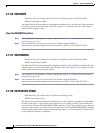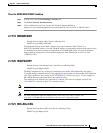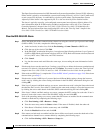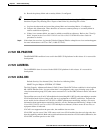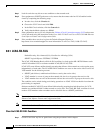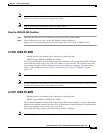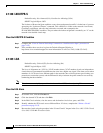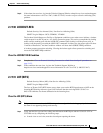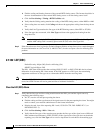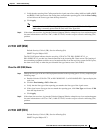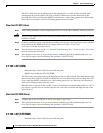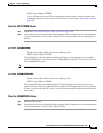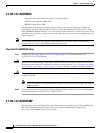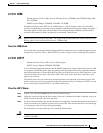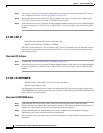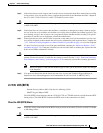
2-86
Cisco ONS 15310-CL and Cisco ONS 15310-MA Troubleshooting Guide, R7.0
Chapter 2 Alarm Troubleshooting
2.7.132 LOF (DS1)
b. Find the coding and framing formats of the external BITS timing source. The formats should be in
the user documentation for the external BITS timing source or on the timing source itself.
c. Click the Provisioning > Timing > BITS Facilities tabs.
d. Verify that the Coding setting matches the coding of the BITS timing source, either B8ZS or AMI.
e. If the coding does not match, click Coding and choose the appropriate coding from the drop-down
list.
f. Verify that Line Type matches the line type of the BITS timing source, either ESF or SF (D4).
g. If the line type does not match, click Line Type and choose the appropriate framing from the
drop-down list.
Note On the timing subtab, the B8ZS coding field is normally paired with ESF in the Line Type field
and the AMI coding field is normally paired with SF (D4) in the Line Type field.
Step 2 If the alarm does not clear, log into the Technical Support Website at http://www.cisco.com/techsupport
for more information or call Cisco TAC (1-800-553-2447) in order to report a Service-Affecting (SA)
problem.
2.7.132 LOF (DS1)
Default Severity: Major (MJ), Service-Affecting (SA)
SONET Logical Object: DS1
The DS-1 LOF alarm indicates that the receiving ONS 15310-CL or ONS 15310-MA has lost frame
delineation in an incoming DS-1 data stream. If the LOF appears on a DS-1 port, the transmitting
equipment could have its line type set to a format that differs from the receiving node.
Note When the ONS 15310-MA raises an LOF (DS1) or LOS (DS1) alarm, a path protection switch will
occur, but a PDI-P alarm will not be generated due to hardware limitations.
Clear the LOF (DS1) Alarm
Step 1 Verify that the line type and line coding match between the DS-1 port and the signal source by
completing the following steps:
a. In CTC, note the slot and port reporting the alarm.
b. Find the coding and line type formats of the signal source for the port reporting the alarm. You might
need to contact your network administrator for the format information.
c. Display the card view of the reporting DS-1 card (15310-CL-CTX, DS1-28/DS3-EC1-3, or
DS1-84/DS3-EC1-3).
d. Click the Provisioning > DS1 > Line tabs.
e. Verify that the line type of the reporting port matches the line type of the signal source (DS4 and
DS4, unframed and unframed, or ESF and ESF). If the signal source line type does not match the
reporting port, click the Line Type cell to reveal a drop-down list and choose the matching type.



